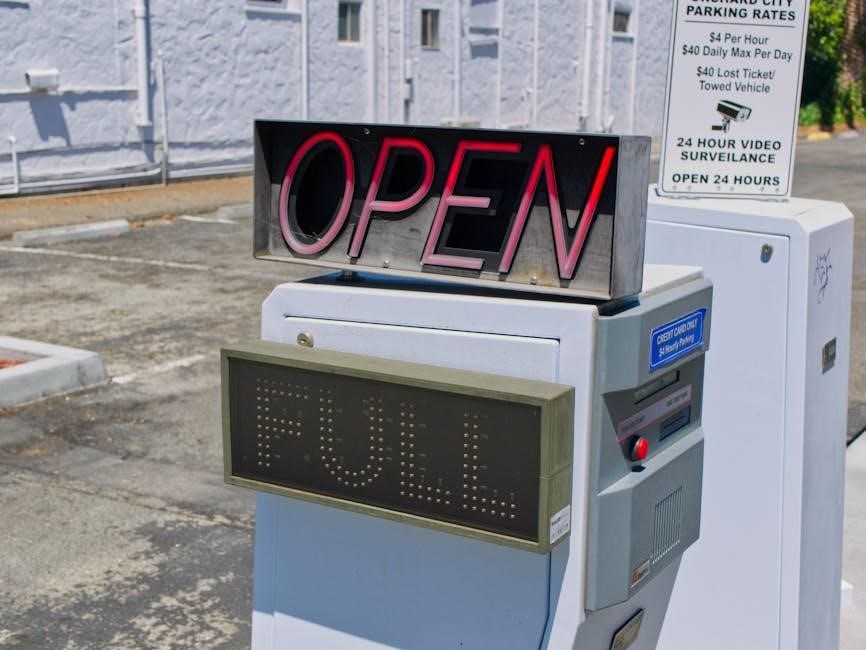Damian Campbell’s “The First 72 Hours” is a digital survival guide offering step-by-step strategies for navigating disasters. It emphasizes preparedness, food, water, and modern crises.
Overview of the Guide and Its Importance
Damian Campbell’s The First 72 Hours is a comprehensive digital survival guide designed to help individuals and families navigate the critical early stages of a crisis. Published by Prepared Patriots, this 93-page manual provides practical, real-world strategies for modern challenges, making it essential for urban and digital environments. Unlike traditional prepper guides, it focuses on actionable steps for securing food, water, and safety, ensuring readers are prepared for any disaster scenario. Its importance lies in its accessibility and relevance, offering a clear, step-by-step approach to crisis management. This guide is not just for survivalists but for anyone seeking to safeguard their family and community during the first 72 hours of a disaster.
Damian Campbell’s Background and Expertise
Damian Campbell is a renowned expert in survival and emergency preparedness, with a strong focus on modern challenges. His work, including The First 72 Hours, reflects his deep understanding of urban and digital environments. Campbell’s expertise is evident in his ability to provide practical, actionable advice tailored to contemporary scenarios. His guides are designed to empower individuals and families, ensuring they are equipped to handle crises effectively. With a background in strategic planning and real-world application, Campbell has established himself as a trusted authority in the field of disaster preparedness.

Key Concepts Covered in the Guide
The guide covers emergency preparedness, crisis navigation, and essential supplies like food and water, tailored for modern challenges and urban environments.
Emergency Preparedness for the Modern World
Damian Campbell’s guide focuses on preparing for modern emergencies, emphasizing the importance of reliable food and water supplies; It provides step-by-step strategies for navigating crises in today’s urban and digital environments. The guide addresses key challenges, offering practical advice for securing essentials and staying informed. Campbell highlights the need for a proactive approach, ensuring individuals and families are equipped to handle the first 72 hours of any disaster. By integrating real-world applications and tailored solutions, the guide serves as a comprehensive resource for contemporary preparedness, ensuring readers are ready to face emergencies effectively and confidently.
Strategic Steps for Navigating Major Crises
Damian Campbell’s guide outlines clear, actionable steps for managing crises, ensuring individuals can respond effectively during the critical first 72 hours. The guide emphasizes the importance of securing essential supplies, such as food and water, while also providing strategies for decision-making under stress. Campbell’s approach is structured to help readers prioritize tasks, stay informed, and adapt to evolving situations. By breaking down complex scenarios into manageable steps, the guide equips individuals with the confidence and knowledge needed to navigate emergencies. This strategic framework ensures that readers are not only prepared but also capable of leading their families and communities through challenging times with clarity and purpose.
The Role of Food and Water Supplies in Survival
Securing reliable food and water supplies is the first and most critical step in surviving any crisis, as emphasized in Damian Campbell’s guide. The book provides practical advice on stockpiling non-perishable food, rationing water, and purifying contaminated sources. Campbell stresses the importance of having at least one gallon of water per person per day for drinking, cooking, and hygiene. He also offers strategies for avoiding dehydration and maintaining nutrition during the initial 72 hours, which are vital for both physical health and mental resilience. By addressing these basic needs, the guide ensures individuals can focus on other aspects of survival, such as safety and communication, during emergencies.

Structure and Content of the Guide
Damian Campbell’s guide offers a step-by-step approach, blending practical advice for urban environments with comprehensive disaster scenarios, ensuring readers are well-prepared for modern crises;
Step-by-Step Approach to Crisis Management
Damian Campbell’s guide provides a clear, structured plan for managing crises. It outlines essential steps, from securing food and water to navigating urban challenges, ensuring practicality and effectiveness. The approach is designed for modern environments, addressing both physical and logistical needs. By breaking down complex scenarios into manageable tasks, the guide empowers individuals to act decisively. This methodical strategy helps users stay calm and focused, crucial during the initial 72 hours of a disaster. The guide’s clarity and organization make it accessible to everyone, regardless of prior experience, fostering confidence and readiness. Each step is tailored to real-world applications, ensuring relevance and applicability. This systematic approach is a cornerstone of the guide’s effectiveness.
Practical Advice for Urban and Digital Environments
Damian Campbell’s guide offers tailored strategies for urban settings, addressing unique challenges like resource scarcity and infrastructure disruptions. It integrates technology, such as using online tools for survival planning and communication. The guide emphasizes the importance of digital preparedness, including securing reliable power sources for devices. Urban-specific tips include navigating crowded areas and utilizing community resources. By blending traditional survival skills with modern tech solutions, the guide equips readers to handle crises in densely populated environments. This fusion of old and new strategies ensures comprehensive preparedness, making it invaluable for city dwellers facing disaster scenarios. The advice is practical, actionable, and designed for real-world urban challenges.
Comprehensive Coverage of Disaster Scenarios
Damian Campbell’s “The First 72 Hours” meticulously covers a wide array of disaster scenarios, ensuring readers are equipped to handle various crises. From natural disasters like earthquakes and hurricanes to pandemics and urban emergencies, the guide provides detailed strategies. It addresses the critical need for adaptable plans, offering solutions for different environments and situations. The guide’s thorough approach ensures that no scenario is overlooked, empowering individuals and families to respond effectively. By focusing on practical, real-world applications, Campbell’s work stands out as a holistic resource for disaster preparedness, making it essential for anyone seeking comprehensive guidance. Its detailed coverage sets a new standard in survival planning.

Psychological and Emotional Preparedness
Damian Campbell emphasizes mental resilience as crucial for survival. His guide teaches how to manage fear and anxiety, ensuring calm decision-making during crises, enhancing overall preparedness.
Mental Resilience During the First 72 Hours
Damian Campbell’s guide highlights the importance of mental resilience in the first 72 hours of a crisis. It provides strategies to stay calm under pressure, make clear decisions, and maintain focus. The guide emphasizes that psychological strength is as vital as physical preparedness. By fostering a mindset of adaptability and confidence, individuals can better navigate chaos. Campbell offers practical techniques to manage stress and anxiety, ensuring that emotional stability supports survival efforts. This approach ensures that readers are equipped not only with physical tools but also with the mental fortitude needed to overcome adversity.
Addressing Fear and Anxiety in Crisis Situations
Damian Campbell’s guide acknowledges the profound impact of fear and anxiety during crises, which can impair decision-making and hinder survival efforts. The guide provides actionable strategies to manage these emotions, emphasizing the importance of staying grounded and focused. Campbell offers techniques such as controlled breathing, mental reframing, and clear communication to maintain emotional stability. By addressing these psychological challenges, individuals can reduce panic and enhance their ability to respond effectively. The guide empowers readers to transform fear into proactive steps, ensuring they remain calm and resourceful during the critical first 72 hours of any disaster.
Community and Family Preparedness
Damian Campbell’s guide emphasizes building strong community and family support networks to enhance survival chances during crises, fostering collaboration and shared responsibility for collective safety.
Building a Support Network for Emergencies
Building a support network is crucial for emergency preparedness, as emphasized in Damian Campbell’s guide. A strong network enhances resilience by fostering collaboration and shared responsibilities. Campbell suggests identifying trusted individuals, assigning roles based on strengths, and maintaining open communication. This collective approach ensures resources, skills, and knowledge are pooled to address crises effectively. Regular drills and meetings can strengthen these bonds, ensuring everyone is prepared. A well-organized support network not only provides emotional backing but also practical assistance, making it easier to navigate the first 72 hours of a disaster. This strategy underscores the importance of community in survival scenarios.
Family-Centric Strategies for Survival
Damian Campbell’s guide emphasizes the importance of family-centric strategies for survival, tailoring preparedness plans to include all household members. Creating customized emergency kits for each family member, establishing a clear communication plan, and designating safe meeting points are key recommendations. The guide also highlights the need to involve children in preparedness efforts, teaching them essential survival skills and ensuring they understand emergency protocols. By fostering a family-oriented approach, Campbell’s strategies aim to strengthen unity and resilience during crises. This focus ensures that every family member is equipped to contribute and stay safe, making the first 72 hours of a disaster more manageable.

Modern Relevance of the Guide
“The First 72 Hours” by Damian Campbell remains highly relevant today, offering practical strategies for urban environments and integrating modern technology to address contemporary crises effectively.
Preparation for Urban Challenges
Damian Campbell’s guide, “The First 72 Hours,” places a strong emphasis on urban preparedness, recognizing the unique challenges of city environments. It addresses the importance of securing food and water supplies, as these are often the first resources to become scarce in urban crises. The guide also integrates modern technology, providing strategies for navigating digital disruptions and leveraging tools for communication and information gathering. Campbell’s approach is tailored to the realities of modern city living, where infrastructure can fail and population density amplifies risks. By focusing on practical, actionable steps, the guide equips urban dwellers with the knowledge to survive and thrive during the critical initial 72 hours of a disaster.
Key strategies include identifying alternative lighting sources, establishing communication protocols, and understanding how to access essential services in a disrupted urban landscape. Campbell’s insights are particularly valuable for those living in densely populated areas, where resource competition and infrastructure dependency are heightened.
Integrating Technology into Survival Plans
Damian Campbell’s “The First 72 Hours” highlights the crucial role of technology in modern survival strategies. The guide emphasizes how digital tools can enhance preparedness and response during crises. Campbell advocates for the use of online platforms to create personalized survival plans, leveraging fillable templates and powerful editors to streamline emergency readiness. He also discusses the importance of converting PDF resources, such as his guide, into accessible formats using tools like Smallpdf or Adobe Acrobat. By integrating technology, individuals can stay informed, communicate effectively, and adapt to rapidly changing situations, ensuring they remain resilient in the face of urban and digital challenges.
Technology’s role in survival is not just about convenience but about efficiency and accessibility, making it a cornerstone of Campbell’s modern approach to emergency preparedness.

Additional Resources and Tools
“The First 72 Hours” by Damian Campbell offers supplementary materials and online tools to enhance preparedness, including fillable templates and a powerful editor for customization.
Supplementary Materials for Enhanced Preparedness
Damian Campbell’s guide, “The First 72 Hours,” is complemented by supplementary materials designed to enhance preparedness. These include fillable templates, a powerful editor for document customization, and a step-by-step approach to crisis management. The guide is available as a digital survival manual, offering practical tools to navigate modern challenges. With a focus on urban and digital environments, it provides resources to address food and water supplies, mental resilience, and community support. The guide’s comprehensive coverage ensures users are equipped with the necessary knowledge and tools to handle various disaster scenarios effectively. Its modern relevance and real-world applications make it a valuable resource for proactive preparedness in today’s fast-paced world.
Online Tools for Customizing Survival Plans
Damian Campbell’s “The First 72 Hours” offers online tools to customize survival plans, ensuring personalized preparedness. These tools include fillable PDF templates for incident reporting and crisis management. Users can utilize online converters like Smallpdf or Adobe Acrobat to adapt the guide to their needs. The digital format allows for easy modifications, enabling individuals to tailor strategies for urban and digital challenges. These resources enhance the guide’s practicality, making it adaptable to various scenarios. By integrating technology, the guide provides a modern approach to survival planning, ensuring users are well-equipped to handle emergencies effectively. This customization feature is a key strength of Campbell’s comprehensive guide.

Real-World Applications of the Guide
The guide provides practical steps for urban crises, helping users secure food and water, and navigate digital challenges, ensuring readiness for real-world emergencies effectively.
Case Studies of Successful Crisis Management
Case studies highlight individuals who effectively applied Damian Campbell’s strategies during real crises, such as hurricanes and urban blackouts. One family used the guide to secure food and water, ensuring survival. Another case involved leveraging technology for communication, aligning with Campbell’s modern approach. These examples demonstrate how the guide’s practical advice enabled individuals to stay safe and resilient during emergencies, proving its real-world effectiveness in crisis management.
Testimonials from Users of the Guide
Users praise “The First 72 Hours” for its practical, real-world advice. Many share stories of how the guide helped them navigate crises confidently. One reviewer highlighted its step-by-step approach as “invaluable” during a natural disaster. Another emphasized how the guide’s focus on food and water supplies ensured their family’s safety. Testimonials frequently mention the guide’s modern strategies, such as integrating technology, as key to their preparedness. Overall, users commend Damian Campbell’s guide for its clarity and effectiveness, stating it has become an essential resource for emergency situations. The positive feedback underscores its role in empowering individuals to face challenges with resilience and confidence.
Damian Campbell’s “The First 72 Hours” is a vital resource for modern preparedness, offering practical strategies and essential insights to navigate crises effectively and confidently.
The Lasting Impact of “The First 72 Hours”
Damian Campbell’s guide has left a lasting legacy in emergency preparedness, empowering individuals and families to face crises with confidence. Its practical, modern approach has resonated widely, making it a bestseller. Many users credit the guide for helping them navigate real-world disasters, showcasing its effectiveness. The comprehensive strategies and emphasis on mental resilience have set a new standard in survival planning. By addressing urban and digital challenges, it has become an indispensable resource for today’s world. The guide’s impact extends beyond immediate crises, fostering a culture of proactive preparedness. Its influence continues to grow, ensuring that more people are equipped to handle the first 72 hours of any disaster.
Encouragement to Take Proactive Steps
Damian Campbell’s guide strongly advocates for proactive preparedness, urging individuals to take immediate action. By providing clear, actionable strategies, it motivates readers to build resilience. The guide emphasizes that preparedness is not just about survival but also about thriving during crises. Campbell encourages everyone to assess their current readiness and take steps to improve it. The guide’s accessible approach makes preparedness feel achievable, even for those new to emergency planning. By fostering a mindset of readiness, “The First 72 Hours” inspires individuals to prioritize their safety and well-being, ensuring they are prepared for whatever challenges lie ahead. This proactive approach has empowered countless individuals to take control of their emergency readiness.



